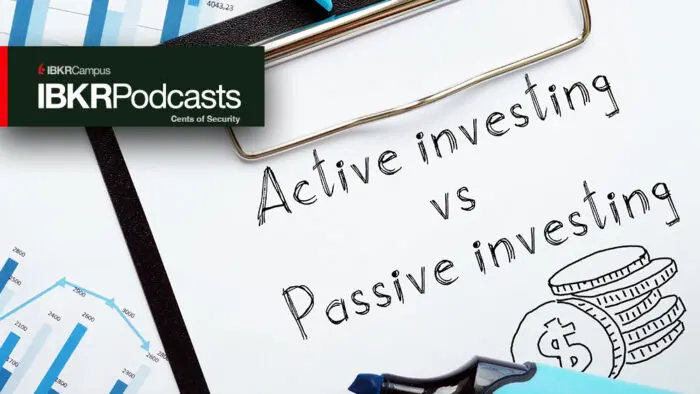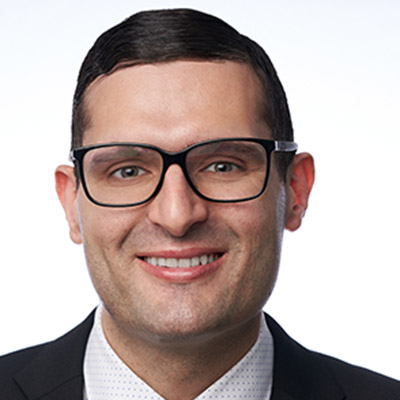Once you start researching investments, you may want to consider your future involvement as the portfolio comes together. How do your goals of the investment impact the strategy? Jose Torres, Interactive Brokers’ Senior Economist joins Cassidy Clement, Senior Manager of SEO and Content to discuss active vs passive investments.
Summary – Cents of Security Podcasts Ep. 44
The following is a summary of a live audio recording and may contain errors in spelling or grammar. Although IBKR has edited for clarity no material changes have been made.
Cassidy Clement
Welcome back to the Cents of Security podcast. I’m Cassidy Clement, Senior Manager of SEO and Content at Interactive Brokers. Today, I’m your host for our podcast and our guest is Jose Torres, IBKR’s Senior Economist.
Once you get started in researching investments, you may want to consider your future involvement as the portfolio comes together. How do your goals of the investment impact your strategy? Today we will explore that idea with discussion on active versus passive investments. Welcome back to the program, Jose.
Jose Torres
Hi Cassidy, great to be here. Hi everyone.
Cassidy Clement
So today we’re going to be comparing active versus passive investing. So, if you were just to explain those as a basic concept to the listeners and then we can kind of go through their differentiation.
Jose Torres
Absolutely. So passive investing has really gained in popularity last few years and really what it is is choosing vehicles where you can park money in and they track larger benchmarks. Baskets of different stocks and bonds, so these benchmarks aren’t changed that often, whereas active management refers to a type of approach where stocks and bonds can be bought and sold opportunistically. Hedges can be put in place and a lot more different aspects of the day-to-day are involved with active versus passive management.
In terms of who would prefer passive versus active management, well, someone that’s looking to dollar cost average in the long term and doesn’t want to pay a lot of fees and isn’t looking to hit home runs every year can be a passive investor and typically a passive investor chooses either stock funds or bond funds. Exchange traded funds, or ETFs on the S&P 500 NASDAQ Composite or the Russell 2000.
In bond land, you have benchmarks that track T-bills or benchmarks that track longer term bonds, or a mix of everything. And really, the vehicles aren’t making day-to-day decisions on what to do, what to get in and out of.
Active management is more for folks that want to choose particular sectors. And want to try and time in the market when it’s good to buy insurance, sell insurance, all those kinds of things. Some folks with the right skill set become really good active managers over the long term, while for other folks it becomes very troublesome because timing the market is indeed a very challenging task.
Cassidy Clement
That’s actually a really good point that you brought up. It’s like the market timing side of being an active manager or actively managing your finances because in some ways when you’re doing the comparison between active versus passive, passive tends to be a little less hands on, I guess you could say.
I mean the fees can generally be lower, it’s a lot more transparent, it’s a lot more efficient in the sense of like okay, this is what you bought, sold, here’s your tax form, where the active side gives you that flexibility, that hedging potential. But you have to do that risk management. You have to look at the management of the overall portfolio to see where you’re at tax wise. To make sure that it’s accurate to what you’re ready to pay or what you’re expecting for the year.
So, for most listeners, they probably heard these two phrases before, but if we were to actually exemplify this, as in, this is an active investment example, and this is a passive investment example, how would you explain or offer up some examples for them?
Jose Torres
When you look at your 401K plans, most folks have 401K plans. You’ll see that some of the funds are passive and track a specific benchmark like the S&P 500 or the NASDAQ or the Russell 2000.
Some others are active and really rely on the portfolio manager’s ability to trade in and out of things, to choose the right sectors, to have a selection on how much growth, how much value, how much cyclical, how much defensive all at the right time. Is right now a good time to put on hedges via perhaps VIX futures, VIX futures calls or puts on the underlying? Or selling calls on individual stocks within the portfolio, right? All those kinds of hedges.
Which ones to put on, which expiry, how much percent of the portfolio, right? Those are the decisions that the portfolio manager of those funds makes. And because all those decisions are deep and require a lot of understanding of what’s happening in financial markets.
The fees are a lot higher on active versus passive, right? Because the passive fund is literally just going to track a benchmark. There’s not someone there that’s actively reducing and increasing exposure at any particular juncture. With active investments there are.
So I told you some examples of passive investing and some ETFs, exchange traded funds, right? And with active investing, some of the examples would be, for example, here at Interactive Brokers, we have hedge funds, so some of our accredited investors are allowed, via our hedge fund marketplace, allowed to choose which hedge fund they want to place a portion of all their capital with.
We also have the financial advisors here that you can choose to manage your investments, right? And some of them tend to be a lot more active than others. So that’s another example of active investing.
Then here, of course, Interactive Brokers, we have a ton of investors that just manage their own portfolio. They want to be in control of their own destiny. And at times, they make really concentrated bets on particular companies that they love, right?
For example, if they really loved NVIDIA for the last three or four years and had a lot or a big portion of their capital in NVIDIA, they’ve been handsomely rewarded today. Whereas if you’ve been in a passive fund, right, you’re not going to have that much exposure to NVIDIA because you’re spread out across everything, right?
So those are some dynamics of what goes on with passive and active investing.
Cassidy Clement
With those strategies, people are probably listening, thinking, hey, maybe one applies to me over the other. In my research I’ve seen some people will say, hey, passive is the way to go or some actually will blend them mainly for the active side, especially if you are actively managing your own portfolio.
It’s really like you’re creating your own personalized structure of your investment portfolio or your experience, if you will, as an investor. And you still need to weigh the different pros and cons, and the biggest one usually is time.
What you can allocate to managing all of these investments to align and balance them towards your financial goal or what each individual goal is for your investment types. Maybe you have a nest egg for a home and you have another one that’s for your vacation every year or on and on and on.
But when it comes to the ideas and the experience and the education from an economist, everyone’s going to ask is one better than the other? And they look to people like yourself to answer that question.
Jose Torres
Look, I think that active investing is better overall because you’re in more control of your destiny and you can make decisions that work best for you at that particular juncture.
Passive investing, however, has done particularly well versus active investments, historically speaking.
And I think the reason why that is is because active investors have tended to be more cautious. The S&P 500, for example, the Nasdaq composite, the Dow Jones Industrial, they’re at all time highs, right? all of them. Literally today. We’re recording the podcast, they all hit all-time highs this morning.
So if you’ve been an active investor and you’ve been cautious and you’ve been buying puts and you’ve been buying VIX calls and selling calls on your underlying right, trying to just be more cautious, it actually hasn’t rewarded you.
So, for that reason, passive investing still has outperformed when you consider the fees versus active investments. Active investment fees can be.. some financial advisors, for example, they charge 1% of the balance that they’re managing for you.
Hedge funds tend to use really exotic strategies. They charge a lot more, traditionally 2 and 20, which is 2% of your balance plus 20% of any profits that they make for you, but hedge funds, in those years that they were cautious, they didn’t make the money that passive funds have made, right? And that really goes back to timing the market and all that kind of stuff. But personally, I like active investing better.
Cassidy Clement
You mentioned actually fees and some of the performance aspect. Those are in my notes as well. I mean the passive area, you tend to have lower funds, but the active area, some people will say, hey, listen, I’m willing to put up with that because I want to be able to really be in there or have somebody with their advisor or whomever, really be in there and have these hedges put into place in the event that the performance does go sour or something of that nature.
So really as an investor, you want to ask yourself, okay, fees, performance, your investment goals, what are they? And then that should probably help you start to find which one you would lean towards.
But from your perspective, Jose, how would a listener kind of know, okay, the active management or the passive management investment style is more aligned with my situation.
Are there certain factors they can look at or questions they should ask themselves, other than the obvious like we said, goals, performance and your fee threshold for cost?
Jose Torres
Sure. So, one thing to consider is what is your expected return, right? Some folks, particularly given the challenging economic environment for some of the younger generations we’ve seen in recent years that a lot of the younger folks have leapt into the markets as a way to change their lives. To literally make triple digit returns in some cases. And for those folks, passive investing is not going to do it for them, right? Because passive investing, historically, in stocks makes roughly 10% a year. In bonds, it maybe makes between 3 and 6%. So return expectations are a huge determinant into whether you want to be active or passive.
With the former, of course, offering stronger returns with, of course, much more risk. On the passive side if you’re kind of happy where you are and you just want to be slow, then passive investing certainly work.
If you’re a little later in life and you want to just be more secure with the assets that you have, then paths of investing, particularly in bond funds, look very appealing because the fees are low. You don’t take virtually any risk. And you’re pretty much guaranteed that your balance overtime will grow.
Cassidy Clement
When it comes to the active management side and there’s active fund managers, is that something that’s just going out and finding a financial advisor or is it as simple as somebody saying, hey, I opened up my IB account and I’m going to do all my trades myself and just be super involved?
Like how easy is it to just dive into some of these investment strategies?
Jose Torres
I mean, it really depends. People with financial economic background, of course they have an advantage if they’re just starting off. But if you’re not really familiar with finance or economics or anything like that, then it could be a lot more difficult to tap in because there’s just so much information that goes into each security that one needs to be mindful of.
But some important considerations are the expense ratio, right? Some passive investment funds charge .07%, .06%, right, which is virtually almost nothing per year. Whereas active strategy sometimes they charge 1%, 2% in the actual vehicle themselves. And of course, if you’re actually working with one person or one firm, then those fees can climb even more.
Cassidy Clement
If you’re a visual learner, something to think about is passive is following those indices or those, I think you said those market segments or those tracking type investment style. So if that goes down, that fund is going down and that is usually in its nature because it’s just following a pattern of what’s in that trend. Wheras active you’re trying to get ahead of it falling and following the trend line, so you’re able to get in there, get active hands on and try to bring it back up again.
So that’s kind of the differentiating factor in there. And that’s also like part of the reason why they have fees. Because somebody’s in there trying to make it perform a certain way or the other way, it’s kind of just set, right?
Jose Torres
Yeah, absolutely. And it’s very stressful when you put on a trade with a lot of confidence for your clients and then it goes the other way. So now the manager is thinking, well, how do I get my money back? Oftentimes that’s leveraging into a trade, that’s finding another idea. And those things of course are stressful and weigh on the manager’s life and calmness.
Cassidy Clement
Absolutely.
Jose Torres
So of course. And finance has always been one of the more rewarding fields when it comes to compensation. So those folks that are managing the money, they do earn a lot and they charge a lot.
Cassidy Clement
Right. I mean that’s kind of the idea..you’re managing a lot. So in some ways- the stress and the calmness, you’ve got to find a way to make it worth it.
If that trend line starts to go down, that can mean something about your bottom line, your business and keeping your clients happy. So that’s a whole other discussion.
But I think we did a really good job today of kind of explaining the baseline of the differences between these investment strategies. So thanks for joining us, Jose.
Jose Torres
My pleasure, Cassidy.
Cassidy Clement
Sure. So as always, listeners can learn more about an array of financial topics for free at ibkrcampus.com. Follow us on your favorite podcast network and feel free to leave us a rating or review. Thanks for listening everyone.
Disclosure: Interactive Brokers
The analysis in this material is provided for information only and is not and should not be construed as an offer to sell or the solicitation of an offer to buy any security. To the extent that this material discusses general market activity, industry or sector trends or other broad-based economic or political conditions, it should not be construed as research or investment advice. To the extent that it includes references to specific securities, commodities, currencies, or other instruments, those references do not constitute a recommendation by IBKR to buy, sell or hold such investments. This material does not and is not intended to take into account the particular financial conditions, investment objectives or requirements of individual customers. Before acting on this material, you should consider whether it is suitable for your particular circumstances and, as necessary, seek professional advice.
The views and opinions expressed herein are those of the author and do not necessarily reflect the views of Interactive Brokers, its affiliates, or its employees.
Disclosure: ETFs
Any discussion or mention of an ETF is not to be construed as recommendation, promotion or solicitation. All investors should review and consider associated investment risks, charges and expenses of the investment company or fund prior to investing. Before acting on this material, you should consider whether it is suitable for your particular circumstances and, as necessary, seek professional advice.
Disclosure: Options Trading
Options involve risk and are not suitable for all investors. Multiple leg strategies, including spreads, will incur multiple commission charges. For more information read the "Characteristics and Risks of Standardized Options" also known as the options disclosure document (ODD) or visit ibkr.com/occ



















Join The Conversation
If you have a general question, it may already be covered in our FAQs. If you have an account-specific question or concern, please reach out to Client Services.